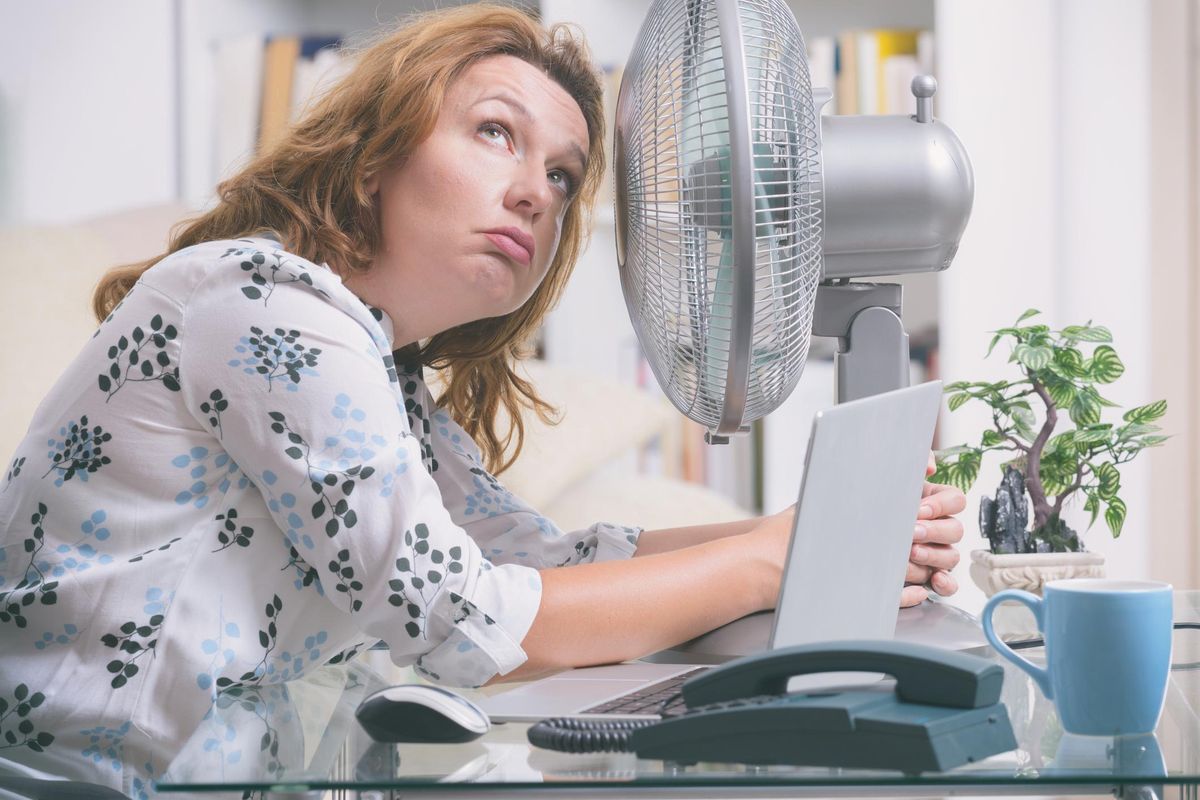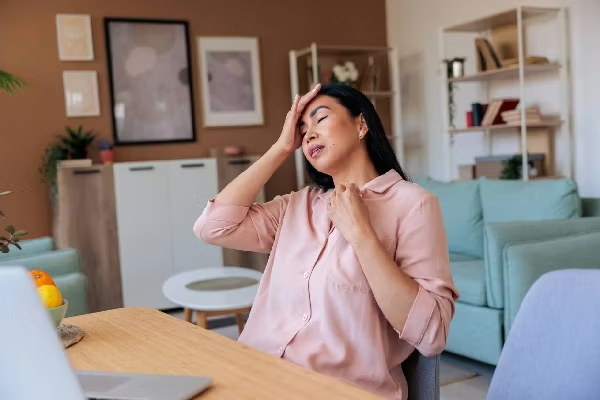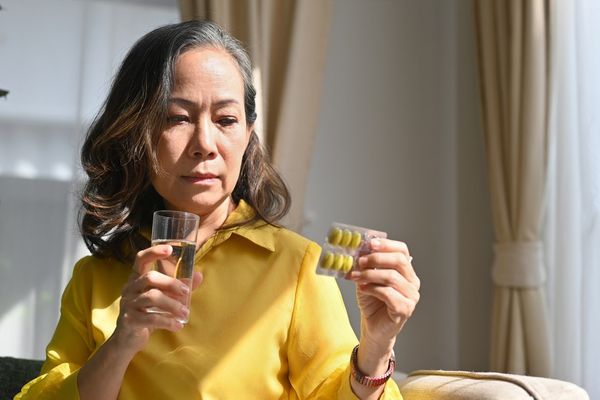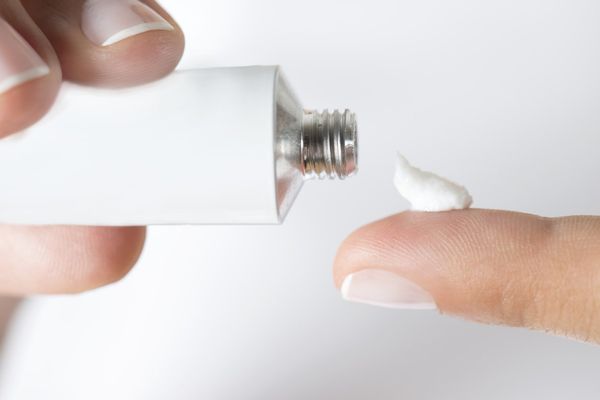Stacia Crawford, 54, has been battling night sweats and hot flashes for the past four years. “Some nights I was unable to sleep because I would go from burning up to freezing in a matter of minutes,” she revealed, noting that she’s often changing her sheets several times a week. “There have been times when I have had to sleep in the spare bedroom because the sweats make me so uncomfortable I can't sleep and it disturbed my husband,” she added. “I also keep a change of clothes in my [car] trunk because sometimes my shirts get so wet it's uncomfortable and embarrassing.”
In addition to wearing lighter clothing and dressing in layers, Crawford has found a few things that have helped to somewhat lessen her symptoms. She cut back on sugar and caffeine, which she has discovered are triggers for her vasomotor menopause symptoms.
What are vasomotor symptoms (VMS)?
Crawford is one of many women who experience vasomotor symptoms, which include hot flashes and night sweats associated with menopause. “They are a very common phenomenon that we see in perimenopause, as well as menopausal women,” explained Dr. Margaret Sullivan, an obstetrician and gynecologist at Tufts Medical Center. “Women will experience sudden flushing with associated feelings of warmth, and then subsequently sweating and a very uncomfortable overall feeling.” And while these symptoms can occur during the day, some women experience them at nighttime, which interrupts their sleep. These symptoms can come on abruptly, making it hard to concentrate at work and causing women to feel groggy the morning after dealing with night sweats.
VMS occurs when neurons (nerve cells) in the hypothalamus, the part of the brain that controls hormone production and temperature, change because of hormonal shifts, like the reduction of estrogen. “And these symptoms occur in about 75% of women going through menopause,” explained Dr. Stephanie Faubion, medical director of the North American Menopause Society and director of Mayo Clinic Center for Women’s Health.
Effective treatments for VMS are available
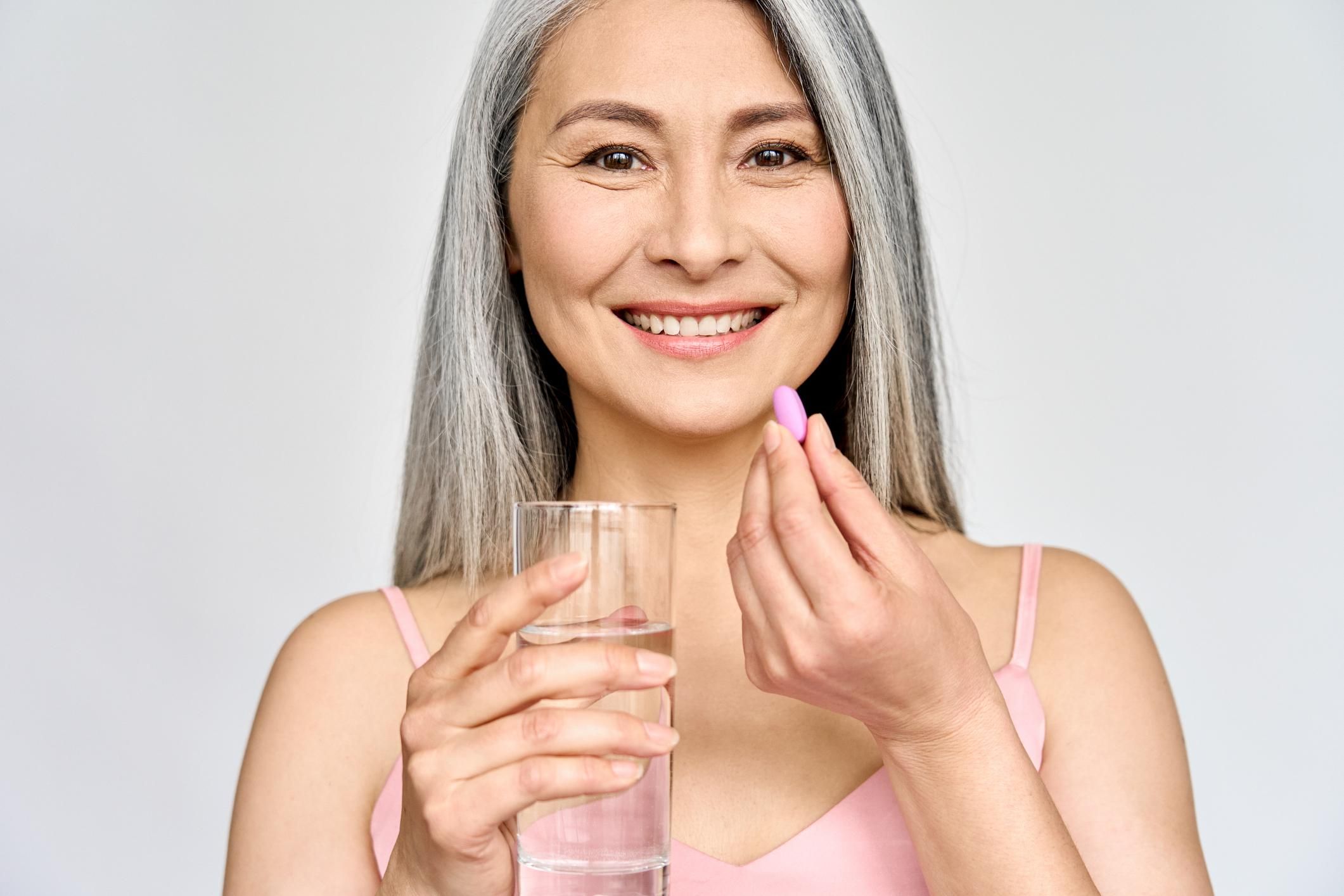
iStock.com/insta_photos
VMS is commonly diagnosed when women of perimenopausal or menopausal age see their physicians complaining of these symptoms. “It’s not uncommon for them to come in and just say the hot flashes are terrible. They make an appointment, and we go over what their options are,” Sullivan said.
“[The symptoms] last for a long period of time, on average seven to nine years,” Faubion said. And there are effective treatments available, including hormone replacement therapy. “It will reduce symptoms by 90 to 95%. And for the majority of women under the age of 60 and within 10 years of their last period, the benefits tend to outweigh the risks,” Faubion added.
There are also some lifestyle changes that women can make. “With anything in medicine, there is a placebo effect with other remedies,” Sullivan said. She explains that some women report benefits in reducing alcohol, sugar or caffeine. “We do tell patients to try to increase dietary sources of estrogen, so anything that has soy in it, yams, that sort of thing, as some people find relief from dietary ingestion of estrogen-based foods,” she explained. There are also supplements, like black cohosh, which some women swear by. Even ones that have clinically been shown to be ineffective can produce some response, according to Sullivan. She tells patients they should be feeling better within a month if they try these dietary and supplemental remedies. “If you're not, then it's probably not doing it for you,” she explained. And it’s always important to check in with your healthcare provider (HCP) before trying home remedies.
Some women are more at risk for severe VMS than others
While VMS can affect all women of perimenopausal and menopausal age, the following are risk factors for more frequent and severe symptoms:
- Being overweight or having obesity
- Smoking
- Poor mental health (depression, anxiety, high stress)
- Adverse childhood experiences (ACES)
- Low socioeconomic factors, such as lower education or lower income
There are some race and ethnicity differences as well. Asian women are less likely to develop severe VMS, and African American and Hispanic women are more likely to report symptoms of VMS than white women. In fact, the condition affects 46% of African American women and 34% of Hispanic women versus 31% of white women. “[VMS symptoms] tend to start a little earlier and last longer in Black women,” said Faubion. In women in general, the mean duration of hot flashes is around 7.4 years. “And about a third of women will hot flash for a decade or longer.”
VMS also puts you at risk of additional illnesses. Studies have linked severe vasomotor symptoms to having an increased risk of cardiovascular disease. And recent research has connected the seriousness and frequency of VMS to future chronic disease such as issues with memory or concentration or bone health issues. Patients that are taking certain medications can also experience vasomotor symptoms as a side effect. “So tamoxifen, for example, for breast cancer can [cause] vasomotor symptoms, even in a woman who has already gone through menopause and her hot flashes have come and gone,” Sullivan said.
The best way to find relief is to speak to your HCP. Sullivan conducted a study and was shocked to see that people report symptoms in 80-90% of cases, but only 30% seek treatment,” Sullivan said. “There is help out there, and you don't have to suffer in silence.”
And there are even treatments available for women who can’t or prefer not to take hormone replacement therapy. “So for breast cancer patients or patients with a history of clotting or liver disease or whatnot, that can't take estrogen, there are alternative types of medications that can get them significant relief,” Sullivan added.
This resource was created with support from Astellas.
- Keep Hot Flashes at Bay When Bundled Up - HealthyWomen ›
- Black Women Often Suffer in Silence During Menopause. I’m Going to Keep Talking. - HealthyWomen ›
- Top 10 Menopause Symptoms - HealthyWomen ›
- Hot Flashes Getting You Down? Here's a Reason to Feel Up - HealthyWomen ›
- What No One Tells You About Menopause - HealthyWomen ›
- What Is VMS? Hot Flashes and Night Sweats. - HealthyWomen ›
- Tips for Reducing Vasomotor Symptoms During Menopause - HealthyWomen ›
- Get Good Menopuase Care with the Right Healthcare Provider - HealthyWomen ›
- How Hot Flashes Affect Sleep - HealthyWomen ›
- Is It Menopause or Something Else? - HealthyWomen ›
- Ways to Cope with Common Menopause Symptoms - HealthyWomen ›
- 8 Ways to Deal With Hot Flashes in the Heat - HealthyWomen ›
- Let's Talk About Menopause - HealthyWomen ›
- Remedy for Irregular Periods and Hot Flashes - HealthyWomen ›
- Symptoms of Menopause - HealthyWomen ›

